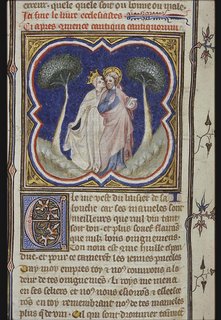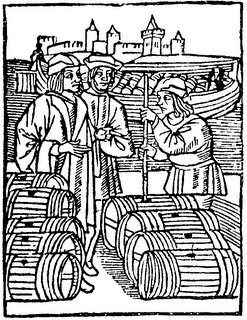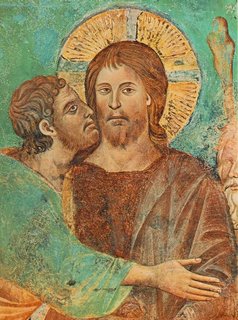
The Church (Ecclesia) as the bride of Christ in a late medieval manuscript.
Happy New Year one and all.
I have written before on current events in the Catholic Church, especially the question of gay priests, but I have yet to really write about how I see myself personally as a member of the Church. I have been back in the pew for a year now, it's time to talk about it.
My return to being a practicing Catholic has surprised and intrigued some friends of mine, especially those who are ex-Catholics or somewhat fallen-away Catholics. I'm sure once I crawl out of the hole called grad school and get back in touch with non-Catholic friends there will be confusion there as well. Many of these people equate being Catholic with absolute obedience to every word sent out from Rome, and once they have confirmed that I am far from agreeing with many current Vatican positions, they wonder if I know what I'm doing. They must think (and so do many of my more conservative Catholic brothers and sisters that I have come across on the web) that it would be much more consistent for people like me to give up on all this Romish nonsense and join a more enlightened denomination, say the Episcopalians or the Unitarians.
Now, there are a number of ways to reply to this line of thinking. One would be to point to the immense richness and diversity of this Church, a Church that has remained open to a wide variety of opinions despite the great effort at centralization that has taken place in Rome under John Paul I and Benedict XVI. Another would be to remind my interlocutors of the importance of conscience in the Catholic tradition -- this is not just an easy excuse, but rather a recognition of the difficult task of balancing the inner self and a humble desire for unity and community. I could state that the Church is not only the institution and hierarchy, but the whole of believers, the Body of Christ. I could go on and on in this vein, and I probably will return to these issues in later posts, but I would rather comment on the difference in perception of this matter that I have noticed in myself, on one hand, and on those not actively inside the Church, on the other.
I have problems with the hierarchy of the Catholic Church on a number of issues: clerical celibacy, women priests, homosexuality (actually many of the Church's official positions on sexuality in general), birth control, and lay participation in the governance of the Church, to name a few. I am pro-choice and I believe that the Church's official stand on stem cell research and euthanasia could use more nuance. In certain occasions, I believe the Church hierarchy's actions have been reprehensible -- the reaction to pedophile priests and the misinformation given about condoms and AIDS, for example. (Notice how I refer to "hierarchy" and "official" and not just "the Church." Once again, that's another question).
Given my problems and occasional outrage, why don't I drop my rosary and walk out the Church doors? Because the Church is not a club, it is not a political party. It is not a corporation that someone works for or supports as a consumer. This is something that my friends who are not practicing Catholics do not seem to understand. It is more like a homeland. I lived in Spain for ten years and spoke the language almost perfectly (though with a thick accent). I understood obscure cultural references and intricate puns. I felt quite at home there. Still, even were I to become a Spanish citizen and never come back, I would never lose my Americanness. Even though my politics are far to the left of every important US politician, I am American. The same thing is true about my Catholicness. My understanding of the religious experience is tied up with the tradition and liturgy of the Catholic Church. I do not claim that a Catholic is closer to God than an Episcopalian or a Unitarian, I have tremendous respect for those traditions, but when I walk into St John the Divine I do not feel that, as a sacred space, it is organized in a way that relates to me. Catholic sacramentality, Catholic imagery, and Catholic devotion speaks to me. I feel with very little doubt that this is where God wants me to be.
Of course, who knows what the future may hold? I may be blinded on the road to Damascus or the number three train and be converted to Methodism, Judaism, or Buddhism. I doubt it, but who knows? I know I won't be forced out of my two-thousand-year-old Church by the opinions of a small group of men at the top. I will try to understand them, always respect their offices, and follow my conscience. I will be part of this Church whether they want me there or not. I pray that I have both the strength to do what is right and the humility not to assume I am always right, and thus to always serve the
Sancta Mater Ecclesia, the bride of Christ.
 Medieval wine merchants.
Medieval wine merchants.




